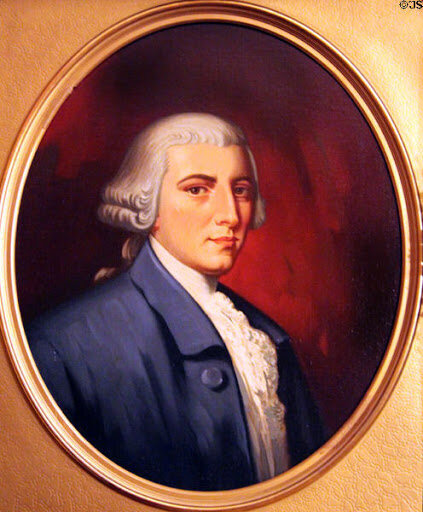
Benjamin Harrison
Virginia
Benjamin Harrison V is a man who came from and carried on a lineage of power and resource. He exerted influence through his person and through his descendants. A man whose physical size revealed his love of wine and fine foods.
Benjamin Harrison was born on April 5, 1726, in Berkeley, VA. He studied the classics at William and Mary College, where he met Thomas Jefferson and Patrick Henry. His time at college abruptly ended when his father and two of his sisters were killed by a lightning strike in July of 1745. The 19-year-old young man assumed management of his late father’s businesses, which included a 1,000-acre farm, shipbuilding, and horse breeding.
At the age of 38 years, Benjamin Harrison was elected to the House of Burgesses. In 1764, the Stamp Act created a brewing contempt for British power that would reach a boil and bring about the colonists’ desire to separate themselves from England. The law placed a tax on certain papers being imported into the colonies. The Burgesses replied with the Virginia Resolves, a statement concerning personal liberty and self-governance, which irked both the crown and Virginia’s royal governor. The governor tried to bribe Mr. Harrison with a position on the executive council. He refused. He also rejected Patrick Henry’s resolutions calling for civil disobedience.
In 1774, the House of Burgesses showed support for the Boston tea protests and was promptly dissolved by the royal governor. It met informally and selected men to represent Virginia in the First Continental Congress. Benjamin Harrison was among those chosen. In Philadelphia, the Congress convened and Mr. Harrison was an integral part of the proceedings. He chaired the debate concerning the Articles of Association, which were a response to the Parliament’s “Intolerable Acts,” a term applied by the colonists to unjust laws passed by Parliament. The articles called for a boycott on importing and exporting British goods and rules governing the proposed boycott. The measure passed. Mr. Harrison also chaired the debate about the Declaration and the Articles of Confederation. Of note, he boarded with his cousins, George Washington and Peyton Randolph when he first arrived in Philadelphia.
In the summer of 1776, Benjamin Harrison supported Richard Henry Lee’s resolution for independence and chaired the deliberations regarding the Declaration of Independence. Possessing a healthy sense of humor, at the signing of the Declaration of Independence on August 2nd, Benjamin Harrison quipped to Elbridge Gerry, “I shall have a great advantage over you, Mr. Gerry, when we are all hung for what we are now doing. From the size and weight of my body, I shall die in a few minutes and be with the Angels, but from the lightness of your body you will dance in the air an hour or two before you are dead.”
During the war, Mr. Harrison sat on the Secret Correspondence Committee and worked to gather financial support and other forms of assistance from foreign powers. He also helped build up and outfit the Continental Army. Back in Virginia, he served as lieutenant in the county militia and was a magistrate.
The Harrison family, at times called the first family of Virginia, was known for their antagonism against the crown and Parliament regarding individual rights. At one point in time, a member of the family quarreled with the British government about the issue and was imprisoned. Benjamin Harrison carried this banner into the deliberations of the Virginia Ratification Convention of 1788. He lobbied strongly for the inclusion of a bill of rights to the proposed constitution of the infant nation. His and others’ efforts failed, but only for a time. A bill of rights was added three years later after his death. Despite the Constitution of the United States not containing a section on guaranteed rights, Mr. Harrison did vote for the new constitution and supported the new government it formed.
Mr. Harrison returned to the state legislature in 1791. His time was short, however. A case of severe gout forced him to convalesce at Berkeley, his manor. He did not recover and died on April 24, 1791. On that date, the United States and Virginia lost a man with “great firmness, good sense, and a peculiar sagacity in difficult and critical situations” as described by a congressional colleague. His legacy lived on in his descendants, particularly his son, William Henry, and his great-grandson, Benjamin, who became military generals and presidents of the United States.
Benjamin Harrison V lived to be 65 years of age.


